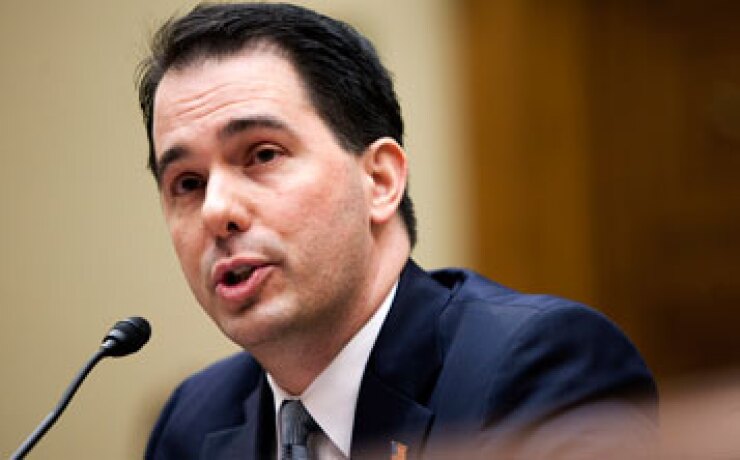CHICAGO – Wisconsin lawmakers this week began a special session called by Gov. Scott Walker on a $3 billion incentive package that helped lure Foxconn Technology Group to build an up-to-$10 billion electronics plant in the state.

“This is a once-in-a-century opportunity for our state and our country, and Wisconsin is ready,” Walker said in calling the session, which has pushed passage of an overdue state budget to the backburner. The deal, announced last month at the White House, was seen as a political win for Walker and President Trump, who had campaigned on promises to bring back manufacturing jobs in the state.
The proposed incentives package authorizes $252 million in general fund borrowing to speed up planned work on a major interstate in southeastern Wisconsin, where the plant is expected to be built. It also allows the state to put its moral obligation behind some local borrowing that’s expected and eases some restrictions on tax-increment financing rules for local infrastructure costs tied to the project.
The state Assembly held a public hearing Thursday and lawmakers are expected to begin initial voting on the package next week. Final action is planned by mid-month, setting the stage for completion of the deal by the end of September.
Walker signed a memorandum of understanding with officials from the Taiwanese company last week. It calls for an estimated $10 billion capital investment to build and equip the facility by 2020 that will produce liquid crystal display, or LED, products. It’s expected to result in 16,000 construction-related jobs and 13,000 permanent jobs, $348 million in state and local tax revenues during construction, and then $181 million in state and local tax revenues generated annually.
The investment commitment comes with a hefty price tag for the state, which Walker and other supporters say is worth it for a project that marks the largest private economic development investment in the Wisconsin’s history. It requires that the company meet certain investment targets before earning the state subsidies which could cost between $200 million and $250 million a year with a maximum amount of $3 billion in credits over 15 years.
Critics believe the subsidies are not worth it and cite disappointments seen elsewhere on proposed projects where Foxconn has failed to live up to its promises.
In addition to the road borrowing, the bill eases tax increment financing rules to make it easier to raise the capital needed to fund local improvements. Cities and villages are authorized to contract for the acquisition of water, sewer and wastewater treatment facilities using the design-build model.
In addition, the bill allows the state to provide a moral obligation backing on up to 40% of local borrowing to support infrastructure or other work, with the approval of the Department of Administration secretary.
“The language is designed to be somewhat general” on what qualifies for the state backing “to reflect that this is a large project” though details on the local needs are still to be determined, said capital finance director David Erdman.
The state has provided backing for borrowing on other big economic development projects including the Green Bay Packers’ Lambeau Field renovations, the Milwaukee Brewers Miller Park, and the Wisconsin Center District.
The special session is occurring as state GOP leaders continue to haggle over a new two-year state budget that’s now a month overdue. While leaders remain divided on some education issues, the biggest sticking point is how to make up a deficit in state transportation spending. Some lawmakers argue the budget should be wrapped up first, but GOP leaders want to move first on the incentives package.
"For us, the biggest priority is making sure that we have Foxconn moving along,” said Assembly Speaker Robin Vos, R-Rochester.
In a special commentary after the announcement, Moody’s Investors Service said it’s still too early to gauge the overall impact.
“The actual benefit to state and local governments depends on the balance between the jobs and tax revenues generated by the project and the costs of the incentives and other expenditures that may be required,” Moody’s wrote.
“We expect local governments will need to fund related development required to support a campus of the proposed size, which could create growing pains,” the report read. If the initial investment by Foxconn sparks investment from other firms, then growth could support the new costs, Moody's wrote.
Moody’s said the state subsidies amount to about $230,000 per job created, slightly more than an incentive package created in 2014 for Tesla Motors in Nevada.





